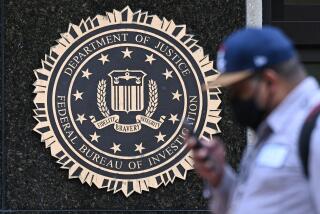Meese Defends His Probe, Denies Any ‘Hint of Crime’ : Says He Had No Cause to Doubt North
- Share via
WASHINGTON — Atty. Gen. Edwin Meese III testified today that he did not turn last November’s Iran arms-sale inquiry into a criminal investigation immediately because he had no reason to believe Lt. Col. Oliver L. North had lied to him or that there was “any hint of criminal activity.”
“At that point, we still hadn’t figured out whether there was any criminality involved,” Meese told the congressional Iran- contra committees as they opened the 11th week of the hearings.
Meese and his assistants interviewed North on Nov. 23, a day after Justice Department investigators found a document in the National Security Council aide’s files revealing that money from Iranian arms sales had been diverted for use of the rebels fighting the Nicaraguan government.
“He was basically forthright,” Meese said of North in the interview, held on a Sunday afternoon in Meese’s fifth-floor office at the Justice Department. “He certainly didn’t appear to be concealing anything.”
However, Meese also said North didn’t mention the diversion until Meese confronted him with the memo--after the attorney general had already led North through a recounting of his Iran activities during 1985 and 1986.
Meese gave North’s apparent truthfulness as his explanation for failing to order North’s office sealed immediately after their talk. North and others have testified that he later shredded documents and that his secretary carried some papers out concealed in her clothing.
“I must say that it’s always easy, some eight months later, to look back. And it certainly looks a lot different to us now than it did then,” Meese said.
There was initially “no hint that criminal activity was in any way implicated,” Meese said.
Meese, the second Cabinet member to testify at the inquiry, sat alone at the witness table, and he never consulted the Justice Department lawyers arrayed in the row behind him. The acrimony between questioners and witness, evident in the testimony of some others, was missing.
Meese said he became concerned last November that there was confusion among top-level officials about the details surrounding an Israeli shipment of arms to Iran in 1985 and suggested to President Reagan that someone be appointed to clear it up.
The President handed Meese the job on Nov. 21, and the attorney general immediately began interviewing such top officials as Secretary of State George P. Shultz and former National Security Adviser Robert C. McFarlane.
Meese told how, the next day, his investigators came upon the diversion memo in North’s files, and then described his own interrogation of the NSC aide.
He said North asked him to delay the interview on Sunday from morning to afternoon so he could attend church with his family. There has been previous testimony that North and McFarlane met that morning.
“What I did was take him through knowledge or lack of knowledge of transactions (the Iran arms sale activities) that occurred in 1985 and 1986,” Meese said. “I exhausted everything we knew without mentioning the diversion.”
He said he then showed the memo to a surprised North, who conceded that a transfer of money to the Nicaraguan contras had taken place.
Meese said he asked North whether the diversion ever was discussed with the President and “he said, not as far as he knew.” The attorney general said North explained that John M. Poindexter, then the national security adviser, “was the contact with the President and that he, North, would not have discussed it with the President.”
Meese said “my own counsel” was to support the secret sale of arms to Iran when his opinion was asked in January, 1986. He said he advised the President it was legal to withhold notification of Congress for a brief period.
More to Read
Get the L.A. Times Politics newsletter
Deeply reported insights into legislation, politics and policy from Sacramento, Washington and beyond. In your inbox twice per week.
You may occasionally receive promotional content from the Los Angeles Times.






